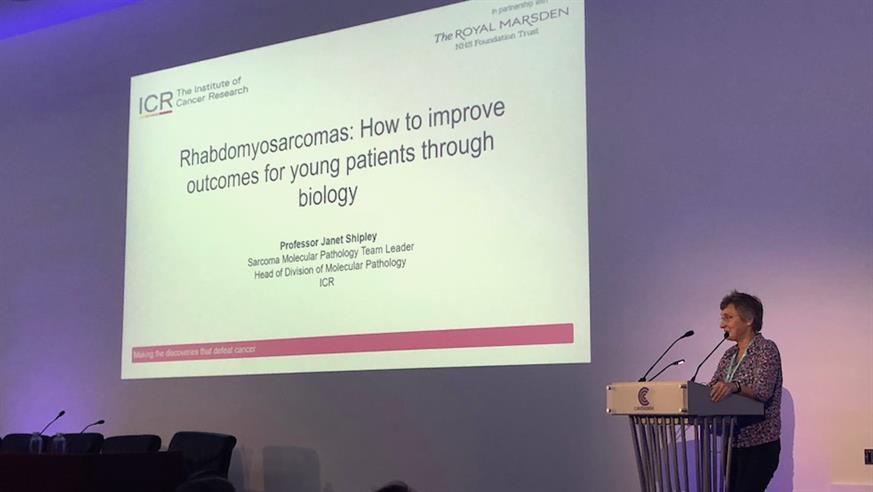
The ICR’s scientists work year-round to study children’s cancers – but every September Childhood Cancer Awareness Month gives us an opportunity to look back on the advances we’ve made and the challenges ahead.
Professor Janet Shipley, who leads the Sarcoma Molecular Pathology Team at the ICR, spoke at the annual Childhood Cancer Conference earlier this month, organised by the Children’s Cancer and Leukaemia Group. Professor Shipley updated parents, researchers and health professionals about her work into rhabdomyosarcoma, a cancer that resembles muscle tissue and that primarily affects children and teenagers.
Rhabdomyosarcoma and other children’s cancers are rare compared with some of the most common adult cancers – around 100-150 times more people die of prostate or bowel cancer every year. But as Professor Shipley explained, when you work back from an average life expectancy of 80, young onset sarcomas have a much bigger impact in terms of the number of years of life lost.
So much of the ICR’s childhood cancer research is made possible by our amazing family charity partners, who have directly felt the devastation of childhood cancer, and who generously fund research at the ICR.
Find out more about their support
'We need to understand the biology'
Professor Shipley believes that looking at the underlying biology of rhabdomyosarcoma has a vital part to play in improving the outcomes for young patients. “We need to understand the biology, because sarcomas are genetically so diverse,” she explained. “The biology will help us understand who will respond to targeted treatments.”
One strand of her research focuses on a particular genetic fault in rhabdomyosarcoma tumours – a fusion of the PAX3 and FOXO1 genes.
Professor Shipley’s team found that fusion genes can be detected in the bloodstream. Once they're validated for clinical use, fusion gene blood tests could help pick out children with rhabdomyosarcoma who are at higher risk of early relapse.
Already, PAX-FOXO1 fusion gene status has been incorporated into the design of a new international clinical trial of rhabdomyosarcoma that will open in the UK soon.
New combinations of existing treatments
At the same time, Professor Shipley’s team is exploring ways to target the gene fusion with new drugs – as well as studying how it could pick out children most likely to respond to new combinations of existing treatments.
Looking at 3D mini-tumours, Professor Shipley’s team found that a combination of an existing chemotherapy and an experimental targeted treatment worked better than either drug alone. The combination killed all cells – and mini-tumours with the gene fusion were even more sensitive to the drug cocktail than those without the fusion.
We will be able to supercharge our research at the ICR into discovering new targeted cancer drugs, for both adults and children, once we finish our Centre for Cancer Drug Discovery.
Throughout September, The Institute of Cancer Research is recognising Childhood Cancer Awareness Month with news stories, videos and blog posts that highlight our latest efforts to improve the lives of children with cancer.
Taking scientific discoveries through to clinical trials
Professor Shipley hopes that combining targeted therapies with chemotherapy could both improve the efficacy of treatments for children while at the same time reducing side effects.
We need better molecular markers and brand new drugs for children with cancer,” Professor Shipley told the audience at the conference, “But very importantly, we need to be repurposing existing drugs.
Just this month, a study led by Professor Louis Chesler showed that around half of children with solid tumours could benefit from targeted drugs that already exist for adults – yet only seven per cent of kids were able to access these drugs.
By taking new discoveries about tumour biology right the way through to clinical trials, Professor Shipley and our other scientists here at the ICR are working every day to make the discoveries that are so desperately needed for children with cancer.